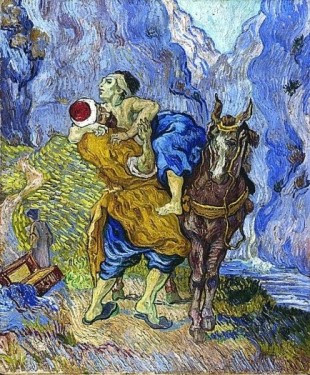PARABLE OF THE GOOD SAMARITAN
(Probably Judea)
LUKE 10:25-37
I remember this parable emphasized in my Catholic childhood---by my "CCD" teachers, not by my parents, who to my knowledge, never commented about the Bible. This morning, I noticed the larger context more than the parable itself.
The older I grow, the more I notice and appreciate context in all areas of reading and life. Context is the frame by which we begin to understand a text or a person on a deeper level.
Here the context is malicious---it's not just a random person with an earnest question, but a lawyer with an agenda, setting a trap. Jesus is a master at turning manipulators back on themselves.
The lawyer tries to narrow the issue to something he can control or justify which also reveals his heart nature:
But he, desiring to justify himself, said to Jesus, “And who is my neighbor?” Luke 10:29
"[The lawyer] sought to justify himself. Why should he? No one had accused him. There was a consciousness of fault and his heart rose up in pride to resist. He asked, “Who is my neighbor?” It was an evasive tactic on his part.-BKC
But Christ keeps the focus on the doing, not the speculating:
 |
| The Good Samaritan,1890 |
"The lawyer had asked his question simply as a test. With him the law was simply matter for speculation and theory, and the word "do" was very startling. It showed the difference between his and the Master's views of the law. He had hoped by a question to expose Jesus as one who set aside the law, but Jesus had exposed the lawyer as one who merely theorized about the law, and himself as one who advocated the doing of the law." -Fourfold
I appreciate this observation as well which points out that the Samaritian combined thought, resources and action--not just one or two facets of himself but all:
"His eye and heart and hand and foot and purse were all subservient to the law of God."--Fourfold Gospel
We prefer to serve in our way, in our "sweet spot," but this teaches broader mercy and service.
"All the laws and teachings of God are to be generously interpreted (Matt. 5:43, 44) and are to be embodied in the life--Matt. 7:24-27." -BKC
Every detail is beautifully adapted to bring out the lesson that the obligation of neighbourly affection has nothing to do with nearness either of race or religion, but is as wide as humanity. -MacLaren
The nations have not yet learned the deep, simple truth of this parable. It absolutely forbids all limitations of mercy and help. It makes every man the neighbour of every man. It carries in germ the great truth of the brotherhood of the race. -MacLaren
"Power or advantage of any kind is not a personal possession, but a trust. “I am a debtor both to the Greeks and to the barbarians; both to the wise and to the unwise,” wrote Paul...The half-dead man had a claim upon priest and Levite and Samaritan. Priest and Levite were faithless to the trust God’s providence brought them opportunity to administer." -G. E. Horr, BI
"God has never left the greatest questions of the human heart unanswered. The great answer to this question about eternal life was not given first of all by Jesus Christ as He appeared in the flesh. Jesus Himself referred to the oldest record; inferentially He said—That question has been answered from the beginning; go back to the very first revelation and testimony of God, and you Will find the answer there. Yet the question is put very significantly: “How readest thou?” There are two ways of reading. There is a way of reading the letter which never gets at the meaning of the spirit. There is a way of reading which merely looks at the letter for a partial purpose, or that a prejudice may be sustained or defended. And there is a way of reading which means, I want to know the truth; I want to see really how this case stands; I am determined to see it. He who reads so will find no end to his lesson, for truth expands and brightens as we study her revelations and her purposes. He who comes merely to the letter will get but a superficial answer in all probability. It was, therefore, of the highest importance that the lawyer should tell how he had been reading the law." -BI
"We do not always turn our knowledge into wisdom. We know the fact, and we hardly ever sublimate the fact into truth." -BI
He said, “The one who showed him mercy.” And Jesus said to him, “You go, and do likewise.” Luke 10:37

No comments:
Post a Comment